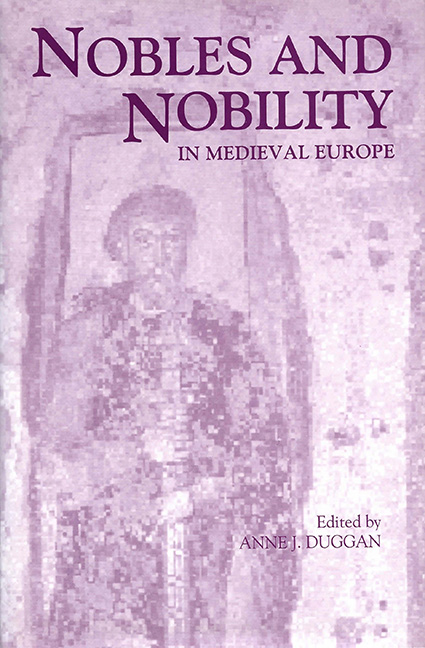 Nobles and Nobility in Medieval Europe
Nobles and Nobility in Medieval Europe Book contents
- Frontmatter
- Contents
- List of Illustrations
- Contributors
- Abbreviations
- Preface
- Dedication
- Introduction: Concepts, Origins, Transformations
- I Early Middle Ages
- II Central Middle Ages
- III Late Middle Ages
- 12 The Nobility of Medieval Portugal (XIth–XIVth Centuries)
- 13 Noblewomen, Family, and Identity in Later Medieval Europe
- 14 The Western Nobility in the Late Middle Ages: A Survey of the Historiography and some Prospects for New Research
- Index
14 - The Western Nobility in the Late Middle Ages: A Survey of the Historiography and some Prospects for New Research
from III - Late Middle Ages
Published online by Cambridge University Press: 25 October 2017
- Frontmatter
- Contents
- List of Illustrations
- Contributors
- Abbreviations
- Preface
- Dedication
- Introduction: Concepts, Origins, Transformations
- I Early Middle Ages
- II Central Middle Ages
- III Late Middle Ages
- 12 The Nobility of Medieval Portugal (XIth–XIVth Centuries)
- 13 Noblewomen, Family, and Identity in Later Medieval Europe
- 14 The Western Nobility in the Late Middle Ages: A Survey of the Historiography and some Prospects for New Research
- Index
Summary
Research on the later medieval nobility is in a healthy state. Everywhere in Europe, new work is being published which adds new clarity to our picture of this social group. The most up-to-date historiography seems to reflect authors’ keen awareness of being part of this renewal. Yet with few exceptions, this enthusiasm for the aristocracy is relatively recent and constitutes a kind of defiance of the old prejudices which until recently were attached to the history of élites. The new research coincides with the discovery of a social history based on prosopography, that is, on the biographical study of large numbers of individuals with the aim of situating them in a large-scale network of kinship, group solidarity, and clientship. It is also true that the nobility during the period from the thirteenth to the fifteenth centuries, thanks to the richness of the source materials, constitutes an ideal field of scholarship for anyone interested in applying prosopographical methods. There was at this period a flowering of chronicles and mémoires, witnesses to nobles’ subjective consciousness describing their social duties, but also such apparently more objective records as hearth-tax returns, notarial documents, administrative enquiries, and legal casematerial. During this same period, moreover, the diffusion of literacy among the aristocracy, and the birth of bureaucratic states, of ‘modern’ type, vastly increased the quantity of relevant documentation.
Now is the time for syntheses! Philippe Contamine's La noblesse au royaume de France de Philippe le Bel à Louis XII, has recently appeared. This fine book, combining large amounts of source material, wide-ranging conclusions, and clarity of presentation, somewhat steals the thunder of the comparable surveys by M.-T. Caron, on royal power and the French nobility, and by M.-C. Gerbet on the Hispanic nobilities. In Britain, Maurice Keen has produced a book of similar importance. These works could never have been written, at least on such a large scale, had their authors not been able to build on the foundations (in the strongest sense of that word) laid by many monographs focusing on particular families and regions, tracing the histories of one or more noble lineages in a limited territory.
- Type
- Chapter
- Information
- Nobles and Nobility in Medieval EuropeConcepts, Origins, Transformations (King's College London 1998), pp. 263 - 274Publisher: Boydell & BrewerPrint publication year: 2000


